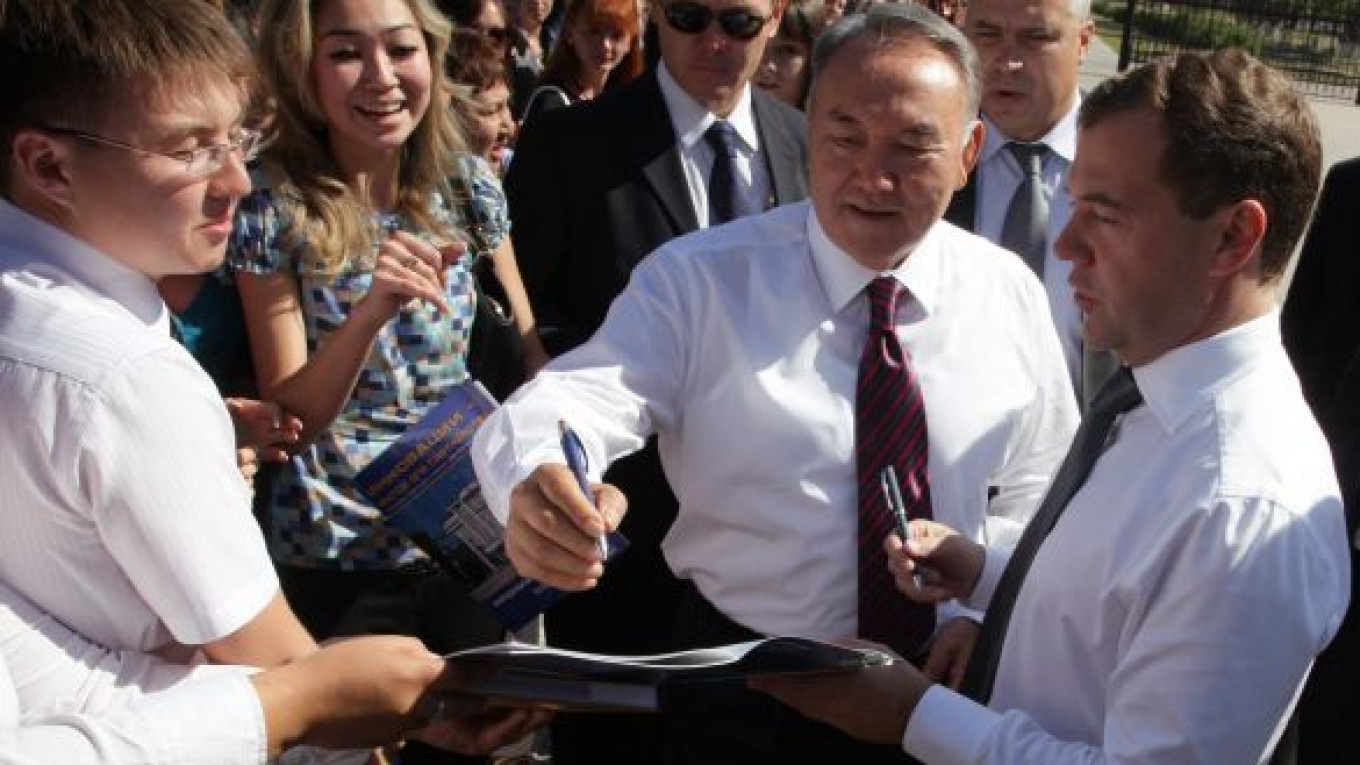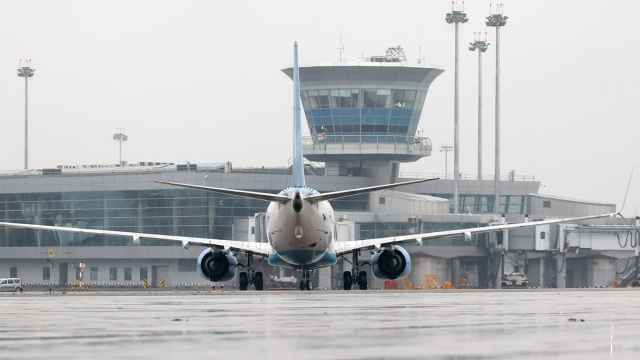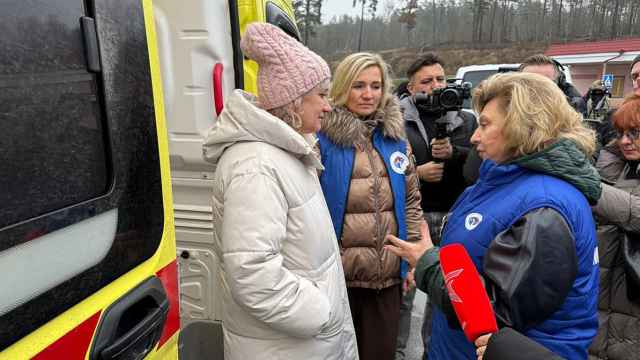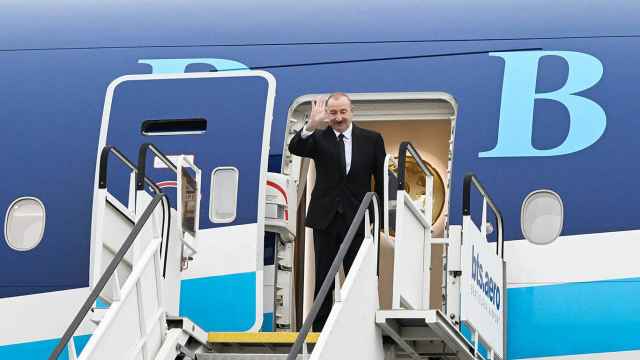OSKEMEN, Kazakhstan — Kazakh President Nursultan Nazarbayev on Tuesday proposed the resurrection of a Soviet-era project to divert Siberian rivers southward to provide drinking water for drought-hit regions of Central Asia.
Nazarbayev said the plan to divert water resources from Arctic-bound rivers, which was abandoned in the 1980s, would equip both Kazakhstan and Russia with the means to overcome future droughts.
"Unfortunately, the issue of water supply is not receiving the attention it merits. Nature has decided to remind us of this fact," Nazarbayev said after meeting President Dmitry Medvedev in the eastern Kazakh city of Oskemen.
"It's imperative that we set our governments the task of taking joint measures to find a solution to these problems," Nazarbayev said.
"For example — as we discussed yesterday and today — why not revisit the project to divert water from Siberian rivers to the southern region of Russia and Kazakhstan?"
He said the project could become "essential for the provision of drinking water for the entire Central Asian region."
Russia's worst heat wave on record has destroyed crops across an area the size of Portugal and is expected to cut economic growth this year and push inflation above target levels. Western regions of Kazakhstan have also suffered from drought.
Kazakhstan will export about 8 million metric tons of grain in 2010 as reserves offset lower yields caused by the drought, Nazarbayev said last week. This year's grain harvest will fall to about 16 million tons from 21 million tons last year, he said.
Drought and record heat have caused more than 39 billion rubles ($1.3 billion) of damage to crops, Agriculture Minister Yelena Skrynnik told lawmakers in Moscow. She said an export ban would be maintained at least into next year, a day after Medvedev suggested it could be reconsidered earlier.
Medvedev, responding to Nazarbayev's proposal, said, "We are open to discussing ideas, including some ideas from the past that had been gathering dust."
Longtime Central Asian leaders, including Nazarbayev, have periodically resurrected talk of the scheme to divert Siberian rivers to irrigate arid farmland and provide drinking water in their countries.
Russia holds about one-fifth of the world's fresh water. It has several major Siberian rivers that flow northward including the Ob, Irtysh and Yenisei, whose sources are in or near Kazakhstan.
Water supply is of growing concern in a world where, according to data quoted by Russian Security Council head Nikolai Patrushev last month, the volume of fresh water consumed worldwide will equal reserves some time between 2035 and 2045.
Patrushev said in an August interview with official daily Rossiiskaya Gazeta that wasteful use of water posed a threat to national security.
Over the past decade, he said, the threat of armed conflict over scarce water reserves had reached a critical point in 46 nations with a combined population of 2.7 billion. He named Central Asia among the high-risk regions.
Countries in the region have quarreled over plans by mountainous republics Tajikistan and Kyrgyzstan to dam rivers for hydroelectric power generation, thus controlling supplies downstream to fields in Uzbekistan and Kazakhstan.
"Attempts to resolve water issues locally, in specific regions, do not have the desired effect," Nazarbayev said.
(Reuters, Bloomberg)
Medvedev ordered Natural Resources and Environment Minister Yury Trutnev to speed up work on a production sharing agreement for the Khvalynskoye field with Kazakhstan in the Caspian Sea.
"If the issue got hung up on the Russian side, we need to sort it out," Medvedev said at a forum in Ust-Kamenogorsk. Kazakhstan's economy minister, Zhanar Aitzhanova, urged Russia to move faster on the agreement.
Total and GDF Suez agreed to buy stakes in the field from KazMunaiGaz National in October. LUKoil holds 50 percent.
Russia and Kazakhstan also agreed to jointly explore a gas condensate field on their border.
Kazakhstan is reviewing the legality of Polyus Gold's 2009 acquisition of KazakhGold Group after revoking its approval this summer, Prime Minister Karim Masimov said Tuesday, Interfax reported.
Polyus has applied to the relevant ministry for authorization of the deal, Interfax reported.
A Message from The Moscow Times:
Dear readers,
We are facing unprecedented challenges. Russia's Prosecutor General's Office has designated The Moscow Times as an "undesirable" organization, criminalizing our work and putting our staff at risk of prosecution. This follows our earlier unjust labeling as a "foreign agent."
These actions are direct attempts to silence independent journalism in Russia. The authorities claim our work "discredits the decisions of the Russian leadership." We see things differently: we strive to provide accurate, unbiased reporting on Russia.
We, the journalists of The Moscow Times, refuse to be silenced. But to continue our work, we need your help.
Your support, no matter how small, makes a world of difference. If you can, please support us monthly starting from just $2. It's quick to set up, and every contribution makes a significant impact.
By supporting The Moscow Times, you're defending open, independent journalism in the face of repression. Thank you for standing with us.
Remind me later.






